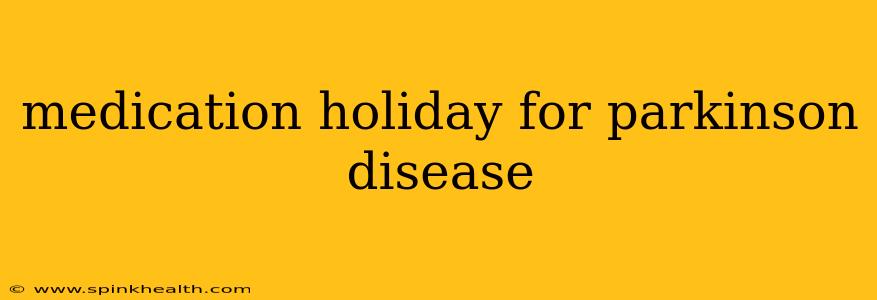Parkinson's disease, a progressive neurological disorder, often requires a complex regimen of medications to manage its debilitating symptoms. But what happens when the very medications designed to help can themselves become a source of concern? This is where the concept of a "medication holiday" enters the picture, a potentially controversial strategy that requires careful consideration and close collaboration with a neurologist.
This isn't about simply stopping medication; it's a meticulously planned and monitored process, potentially offering benefits while carrying inherent risks. Let's delve into the intricacies of medication holidays for Parkinson's disease.
What is a Medication Holiday for Parkinson's Disease?
A medication holiday, also sometimes referred to as a drug holiday, involves temporarily suspending or significantly reducing the dosage of Parkinson's medications, usually dopamine agonists or levodopa. It's not a casual decision; it's a strategic maneuver undertaken under strict medical supervision.
The rationale behind this approach often revolves around managing medication-related side effects. Long-term use of Parkinson's medications can lead to various complications, including dyskinesias (involuntary movements), motor fluctuations (wearing off phenomenon), and other adverse reactions. A temporary break might allow the body to recover and potentially reset the medication's effectiveness.
Why Would a Doctor Recommend a Medication Holiday?
Several factors might prompt a neurologist to consider a medication holiday:
- Intractable Dyskinesias: Severe, debilitating involuntary movements that significantly impair quality of life.
- Motor Fluctuations: Unpredictable swings in motor function, making daily life challenging.
- Medication-Induced Psychosis or Other Psychiatric Symptoms: Hallucinations, delusions, or other mental health issues linked to medication.
- Medication Ineffectiveness: When the benefits of medication no longer outweigh the side effects.
Is a Medication Holiday Right for Everyone with Parkinson's?
Absolutely not. A medication holiday is not a suitable approach for everyone with Parkinson's disease. It's a highly individualized decision based on a careful assessment of the patient's specific circumstances, including:
- Disease Severity: Patients with advanced Parkinson's disease are generally not candidates for a medication holiday.
- Medication History: The type and duration of medication use influence the decision.
- Overall Health: Pre-existing conditions can impact the feasibility and safety of a medication holiday.
What Happens During a Medication Holiday?
A medication holiday is a carefully controlled process. It's not a sudden cessation of medication but rather a gradual tapering down under the close supervision of a neurologist. Regular monitoring of symptoms and overall health is essential throughout the process. The length of the holiday varies widely depending on individual responses.
What are the Potential Risks of a Medication Holiday?
While a medication holiday might offer potential benefits, it's essential to acknowledge the associated risks. These include:
- Symptom Exacerbation: A worsening of Parkinson's symptoms, such as rigidity, tremors, and slowness of movement.
- Neurological Complications: In some cases, a medication holiday can trigger more severe neurological issues.
- Withdrawal Symptoms: Discomfort or other symptoms upon stopping or reducing medication.
What are the Potential Benefits of a Medication Holiday?
The potential upsides include:
- Improved Motor Control: Reduced dyskinesias and improved motor function in some individuals.
- Reduced Side Effects: Alleviation of medication-related side effects such as hallucinations or nausea.
- Restoration of Medication Effectiveness: A temporary break might improve the response to medication upon restarting.
How is a Medication Holiday Monitored?
Regular monitoring is crucial. This typically involves:
- Frequent Neurological Examinations: To assess motor function and other symptoms.
- Symptom Diaries: To track changes in symptoms throughout the holiday.
- Blood Tests: To monitor overall health and detect any potential complications.
Conclusion: A Collaborative Approach
A medication holiday for Parkinson's disease is a complex decision that demands a collaborative approach. Open communication between the patient, neurologist, and other members of the healthcare team is essential for informed decision-making and optimal outcomes. It's not a one-size-fits-all solution, but in carefully selected cases, it might offer a path toward improved symptom management and enhanced quality of life. Always seek the expert advice of your neurologist before considering any changes to your Parkinson's medication regimen.

